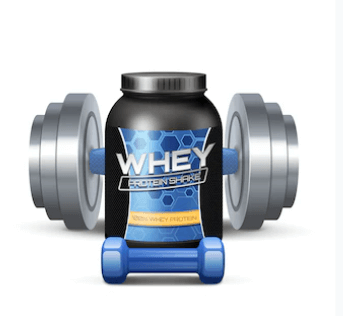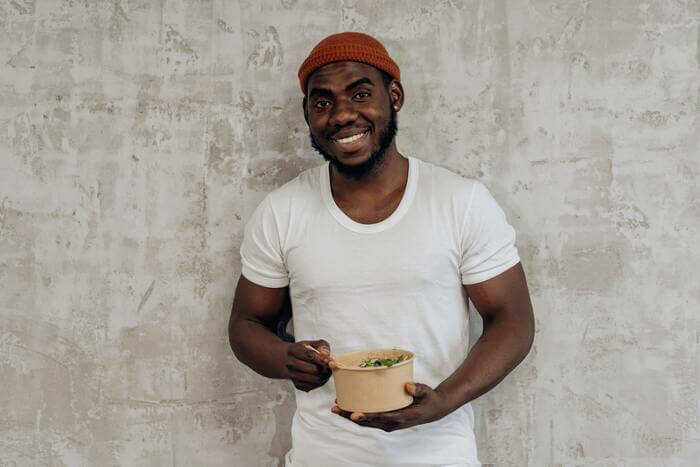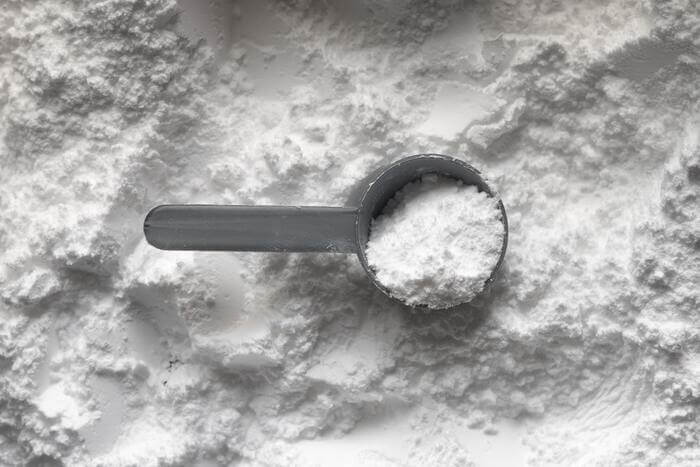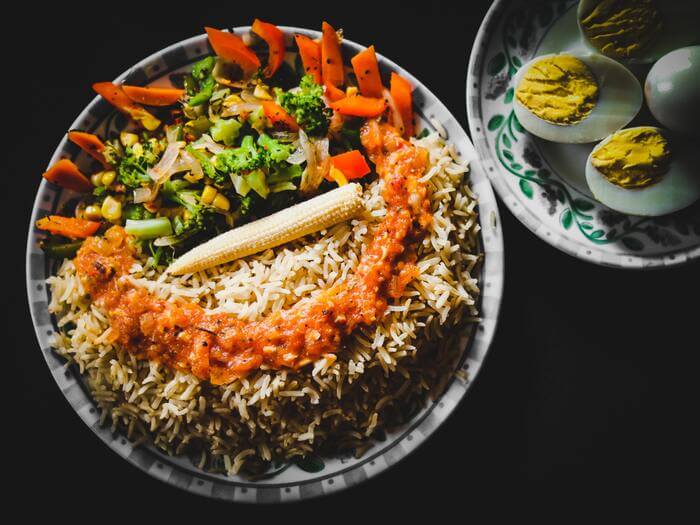
A leaner body makes you look good, but it’s harder to achieve than you might think. Making small adjustments to your nutrition can lead to big changes in the way your body looks and feels.
Whether you’re trying to lose weight or bulk up, following these easy nutrition tips for bodybuilding can help you get the most out of your workouts so that you’re on track to reach your fitness goals.
Table of Contents
Eat Protein
Just like exercise, protein is another one of those crucial factors that bodybuilders should account for. Protein helps build and repair muscles and is therefore a fundamental part of any weight-lifting routine.
Another perk? Protein keeps you feeling full longer after a workout, which can also be beneficial for people trying to lose weight.
A study conducted by The University of Texas at Austin suggests that people who consume 25-30% of their daily calories from protein have greater muscle mass, less fat mass, and an easier time losing weight than those who eat fewer than 15% of their calories from protein.
However, experts suggest that getting about half your calories from protein might be best for most people. That way you don’t go overboard on calories—which can lead to gaining weight instead!
Also, keep in mind that there are some foods with lots of protein but not many other nutritional benefits (e.g., certain energy bars). These aren’t great choices if you’re looking to get enough vitamins and minerals as well as protein.
Keep Hydrated

Getting enough water is absolutely essential for a healthy lifestyle. Water helps with digestion, keeps your organs moving, and carries nutrients throughout your body. If you’re working out, you need even more water in order to flush toxins from your muscles.
Aim for at least 10 glasses of water per day. If that seems like a lot, try splitting it up into smaller glasses—and remember that coffee or tea also count! When in doubt, use an app like MyPlate or MyFitnessPal to help track your intake and make sure you’re meeting your goals.
You may find it helpful to record how much water you drink each day by marking a glass on a chart. Over time, keeping track will help show if you have been getting enough water each day—or not! The American Dietetic Association recommends drinking about 2 liters (about 8 cups) of water daily.
A good rule of thumb is to drink about 8 ounces (240 ml) of fluid every hour while you are awake. This includes coffee, tea, milk, soda, juice and water—in other words just about anything except alcoholic beverages! Remember – Drinking more fluids doesn’t mean that you can eat less food; be careful not to replace meals with liquids as they are less satisfying than solid foods and can actually cause dehydration.
Eat a Variety of Fruits and Vegetables

Despite what you may have heard, there’s no such thing as a bodybuilding diet.
What that means is you need plenty of different fruits and vegetables. We’re not just talking about leafy greens—sweet potatoes, carrots, and other non-starchy vegetables are good too.
Protein is also key. Don’t neglect it just because you’re trying to bulk up—just make sure it comes from quality sources like lean meats and eggs. And don’t forget healthy fats! They help keep you full and give your body energy.
Aim for 1 gram of protein per pound of body weight every day, which should be easy if you eat 6 meals a day with each meal containing at least 20 grams of protein. If weight loss is your goal, aim for 1 gram per pound instead. And don’t forget about carbs!
You need them to fuel your workouts so don’t cut them out completely–instead focus on eating whole grains over refined ones and avoid sugary snacks when possible.
Track What You Eat

While high-intensity cardio burns calories most efficiently, it’s not your friend when it comes to building muscle. If you work out on an empty stomach and eat carbohydrates afterward, you’ll replenish your glycogen stores faster than if you did so after a workout.
Theoretically, that will help muscles recover more quickly so they’re primed for growth. It can also keep blood sugar levels from spiking before your next meal, which is when fat storage is more likely to occur.
In either case, filling up on carbs immediately after weight training is a smart move because it provides nutrients that give muscles what they need—when they need it—to heal and grow (protein), while also helping prevent hunger pangs during longer fasts (carbs).
On days when you don’t lift weights, just make sure you eat enough protein to maintain or build muscle mass. That usually means eating about 0.5 grams per pound of bodyweight each day, or around 120 grams for a 180-pound person.
Don’t Overdo Cardio: You’ve probably heard time and again that steady-state cardio like jogging is great for burning fat and losing weight—and it is!
Know How Much Protein is Good For You

If you’re serious about getting buff, keep in mind that a high-protein diet is one way to pack on muscle. Some people eat more than twice as much protein as they need every day, according to a study in Nutrition Journal. It is one of the most important nutrition tips for bodybuilding.
But if you have too much protein, your body can’t use it all and excretes it. Check with your doctor or a registered dietitian if you have questions about how much protein is good for you.
And be sure to stick with lean sources of protein like chicken, fish, eggs and beans. For those who want to build muscle but don’t want to bulk up, remember that you don’t need extra calories from fat. So skip creamy sauces and dressings on your salad; opt for olive oil instead.
You should also avoid saturated fats such as butter and cream cheese because they contain more calories per gram than other types of fat. Instead, choose unsaturated fats found in nuts, seeds and avocados.
These are better for your heart health anyway!
Have Something in Your Stomach Before Working Out

Going into a workout on an empty stomach can have a negative impact on performance. Studies show that eating something before you exercise can increase your stamina and energy levels by 50%.
A bagel with peanut butter, a fruit smoothie, or even a protein shake is all it takes. The rule of thumb is that you should eat at least three hours before your workout begins. If you work out after work, plan ahead so that you’re not starving when you get home.
Make sure you have food in your house, too—you don’t want to be tempted by fast food or junk food while you’re exhausted. Hydrate Before, During, and After: Dehydration can hinder your performance during workouts.
While it may seem counterintuitive to drink water while exercising (because we think we might cramp up), studies show that drinking plenty of water beforehand improves athletic performance because our bodies are better able to regulate temperature during exercise when they are properly hydrated.
It also helps us maintain a steady blood sugar level throughout our workouts.
Use Supplements Wisely

While supplements are not required for you to build muscle and lose fat, they can help improve your results by providing extra nutrients.
A good bodybuilding supplement is a combination of different vitamins, minerals, protein and amino acids that help build muscle faster than your body would be able to on its own.
Building muscle in conjunction with proper nutrition and exercise is key because as we’ve already discussed, muscles have an increased metabolic rate so we burn more calories at rest. It’s important that you choose supplements wisely, however.
Supplements do not act as a substitute for exercise or healthy eating habits. You should always check with your doctor before taking any new supplements, especially if you take other medications.
Also remember that when it comes to supplements, quality matters! Be sure to purchase from reputable brands and don’t buy cheap knock-offs; these products may contain dangerous ingredients such as talc and lead.
Eat Carbs After Weight Training but Prior to Cardio/High Intensity Activities

It’s time for a healthy serving of carbs. When you are lifting weights, your body is generally using carbohydrates as its primary fuel source. It is also one of the most common nutrition tips for bodybuilding.
If you’re doing cardio or engaging in high-intensity activities, then fat will be your main energy source during those activities. So if you want to build muscle while also keeping fat at bay, carbo-load immediately after weight training but prior to your cardio session.
This strategy works especially well if you lift weights in the morning and do any type of cardio in late afternoon or evening hours.
The best types of carbs to eat post-workout include rice, oatmeal, potatoes, pasta and other starchy vegetables.
Whole grains are preferable over refined grains because they provide more nutrients like vitamins and minerals that aid recovery from exercise.
FAQs
How can I bulk up?
Bulking up is often a popular goal among bodybuilders, but it takes a lot of time and can lead to excess fat gain. To avoid storing extra calories as fat, it’s important to keep your total caloric intake within 1,000-1,500 calories per day. Make sure you’re eating enough protein (1 gram per pound) and complex carbs (3-4 grams per pound), while avoiding simple carbs. For every 25 grams of protein consumed daily, you’ll gain one pound of muscle—this is much more likely than gaining a pound simply from overeating. The key is to make sure that most calories come from lean sources, like chicken breast or tuna fish.
Is 5 meals a day enough to build muscle?
When it comes to building muscle, you need good nutrition. But how many meals should you eat? This can be an important question for those who are serious about their fitness, because there are several rules of thumb that say eating X number of times a day will help with weight loss or muscle gain. Should you eat 5-6 meals a day? How about 3 meals and 2 snacks? Is there any truth behind these rules? The answer depends on your personal metabolism and body composition goals, but if you want to build muscle fast, it’s not going to hurt if you start putting some thought into meal timing now. Here’s what we know about eating frequencies for weight loss vs weight gain; what works for one may not work for another!
What bodybuilders should not eat?
If you are involved in bodybuilding and your objective is to build muscle mass, there are a number of foods that you should avoid because they’ll slow down your muscle-building process. Some simple tips for what bodybuilders should not eat are listed below. However, if you are a health enthusiast who wants to stay fit and healthy without focusing on building muscles, then it’s okay for you to consume these foods regularly. However, if your goal is building muscles then steer clear from these foods as much as possible.













